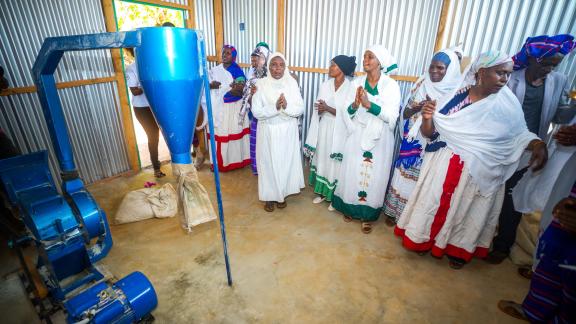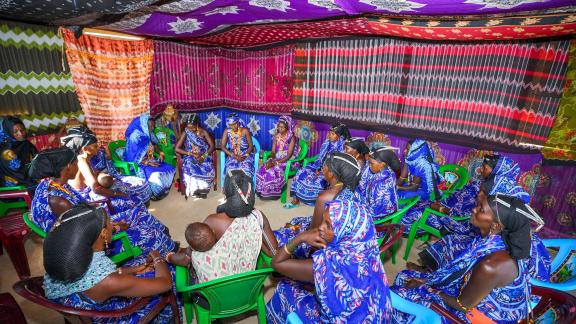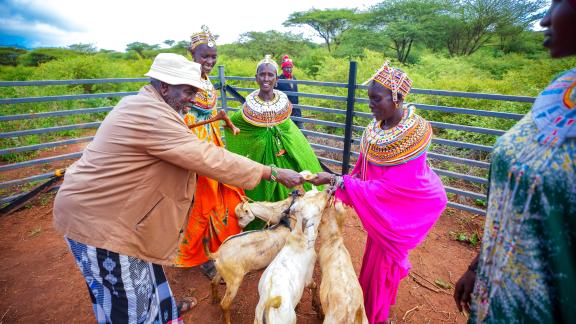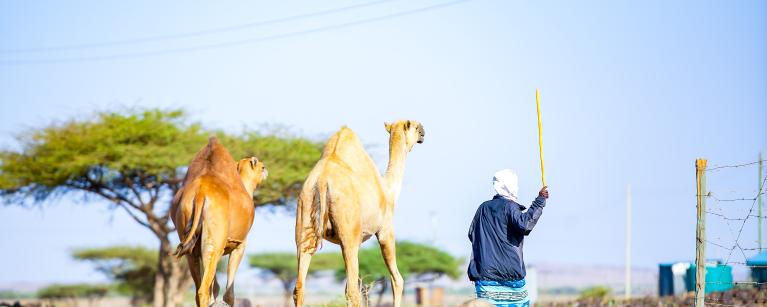In recent years, the escalating climate crisis has drastically worsened living conditions in Kenya's Arid and Semi-Arid Lands (ASALs). Among these regions is Marsabit County, fondly referred to as the Cradle of Mankind and home to diverse communities such as the Borana, Gabbra, Rendille, Samburu, and Burji which rely heavily on livestock and agriculture for survival. With the relentless blows of climate change, including the prolonged drought of 2021-2023, and the devastating floods that followed immediately after the drought, communities in Marsabit have found it increasingly necessary to diversify their livelihoods to adapt and endure.
This environmental instability has not only decimated livestock and disrupted agriculture but also fueled tribal clashes, leading to loss of lives and heightened tensions in the region.
In collaboration with Marsabit Women Advocacy and Development Organization (MWADO), Oxfam in Kenya with the funding from the Danish Government offered financial support in form of cash grants to different self-help groups in Marsabit to help the community bounce back from the effects of drought by diversifying their livelihoods.
Through this initiative, 24 self-help groups in Saku sub-county, in the Central, Karare and Sagante Jaldesa wards have received cash grants in 2024, enabling them to build alternative livelihoods, and support their families and communities at large.
Saqake Self-help Group
Saqake self-help group in Marsabit’s Olla Duriye area was established in 2013 and is comprised of twenty-four small-holder farmers and business owners, both men and women of the Burji community. The group owns a teff farm as well as another farm where they grow maize and beans. Habiba Boru has been the group chairperson since they started.
Before this posho mill was established, community members had to walk 6km to the nearest on in town. Every group member has a shift at the posho mill and they keep records of all the money made daily.
They now aspire to grow and be able to support other groups in the area to grow the wider community's economic power and improve their livelihood.
“We wrote a proposal to MWADO because we wanted to expand our business. We had acquired a milling machine but had no structure to put it in. Through Oxfam, with the support of the Danish government, we received KSh.220,000 which we used to build our structure and did wiring for electricity. We have been in operation since October 2024.”

Saqake Self-help Group members at the group's miller. Photo by Shaffi Abdi/Oxfam.
Segel Machesa Self-help Group
In Segel, we meet the Segel Machesa Self-help group, a collective of like–minded women from the Borana community. Due to the rocky terrain, the people of Segel rely on pastoralism as their primary livelihood.
Gumato Bagajo, the chairlady of the group shares that, before the drought, the self-help group sold liquid soap. However, as the drought persisted, they redirected the money meant for soap materials to support their families instead.
Segel Machesa wrote a proposal to MWADO and received KSh.220,000 which they used to build a meeting hall and buy some chairs which they intend to hire to groups for meetings and during community events such as weddings or wakes.

Segel Machesa Self-Help Group at the group's hall in Marsabit. Photo by Shaffi Abdi/Oxfam.
“The first time we were called and told we have received the grant we were so happy. And even after that, we have been called for different trainings. This community does not have a toilet/pit latrine and so people help themselves anywhere they can. Because of this, a comfortable place to meet became a necessity for the group because we used to meet under a tree. We agreed to build a hall which we would also hire. The group hopes to build a kitchen and latrine close to the hall, for the community to use.”
Naramatu Women Group
Priscilla Leogusa is the secretary for the Naramatu Women Group in Karare. In the Samburu community, naramatu means unity.
“With the money we received from MWADO, we bought goats, which we sell at a profit. The price of a goat ranges from KSh. 4,000 to 5,000. We chose the goat business because we are a pastoralist community, and we will always have need for livestock.” Says Priscilla Leogusa.
The drought decimated much of the community’s livestock as pasture grew scarce by the day. For example, Priscilla and her husband once had 10 cows; 8 died, they sold one and now only one remains.
The Naramatu Women Group sell the goats at the Lekartinya market every Thursday.

Naramatu Women Group members selling their goats at a local market. Photo by Shariff Abdi/Oxfam.
According to Mary Nasibo, the Project Officer at MWADO, the cash grants have not only supported the groups in their economic ventures but has also fostered unity among the women themselves and their communities at large. Other groups that took part in this initiative include Qarqab Women Group and Rumai self-help group.
MWADO worked collaboratively with the community as stakeholders through the Survivor and Community Led Response (SCLR) approach allowing them to own the process even as they rebuild their resilience through different economic activities and life skills training. As explained by Godana Wario, the Community Resource Person at MWADO, this approach is based on the premise that, the community are the first and last responders in times of crisis. This approach builds trust and encourages accountability.
The resilience of the self-help groups highlights a simple truth: when provided with resources, communities can turn adversity into opportunity. The cash grants not only provided a lifeline but also planted seeds of sustainable change and subsequently proved that even in harsh conditions, communities can thrive with hope and hard work.
